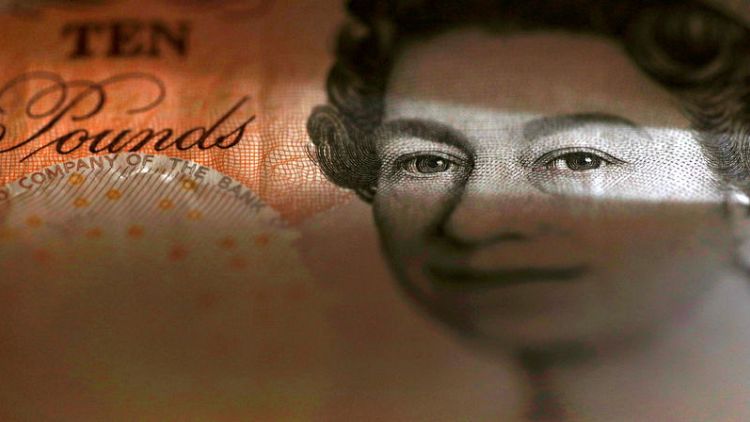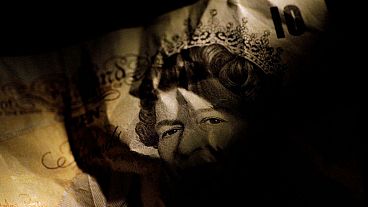By Saikat Chatterjee
LONDON (Reuters) - Prime Minister Boris Johnson's most audacious bid yet to take Britain out of the European Union on Oct. 31 with or without a deal on their future relations is not panicking money managers yet.
Some even sense an opportunity, believing the British currency is cheap, and the government's gambit could make clinching a new withdrawal deal with the EU more likely.
Johnson on Wednesday received royal approval to suspend parliament for a month from mid-September to mid-October. Critics have called it an outrageous move aimed at limiting the amount of time lawmakers have to pass legislation to stop a no-deal Brexit before Oct. 31.
For his part, Johnson insisted there would still be plenty of time for parliamentarians to debate Brexit.
Sterling dropped more than 1% early on Wednesday, bruised by the prospect of an economically damaging withdrawal from the EU, and another showdown between the government and parliament that may end in a general election. Markets rushed to price in more volatility for the British exchange rate between now and November.
But this week's move southwards was orderly - and at around $1.22 <GBP=D3> sterling is still quite a way from the 2-1/2-year low of $1.2015 reached earlier this month. The pound is also nearly 3% above its 2019 low against the euro <EURGBP=D3>.
That's partly because many traders have already slashed their sterling exposure, leaving fewer people in desperate need to offload. Some also argue that negative news is largely priced in - notwithstanding the wild swings likely over the next two months, the pound should eventually be worth much more, they say.
"Even if we fall into a no-deal Brexit, we could see a downside of about 5% from current levels but the upside could be more, especially if officials respond with a stimulus package to cushion the economic impact," said Ugo Lancioni, managing director of global fixed income and currency management at Neuberger Berman.
Lancioni, who manages about $41 billion of assets, is positioned positively on the pound, citing the relatively low value of the currency compared with other developed market peers.
Against a historical average dating back nearly 30 years, the pound is about 17% undervalued on a trade-weighted basis, according to a Bank of England index <GBPTWI=BOEL>.
Versus its developed G10 peers, the British currency is the fourth-cheapest on a 10-year average based on trade-weighted indexes adjusted for inflation.
(GRAPHIC: G10 FX Valuations - https://fingfx.thomsonreuters.com/gfx/mkt/12/5383/5333/fx%20valuations.png)
DEAL MORE LIKELY?
Valuations aren't the only factor encouraging some money managers to buy sterling.
Despite this week's events, most big banks still see a no-deal Brexit on Oct. 31 as an unlikely outcome. Some such as JP Morgan assess that probability at 35% - up from a previous 25% - while others such as Nomura and Deutsche Bank put it between 40%-50%.
Credit Suisse said on Thursday it had kept its no-deal Brexit probability at 35%.
Ulrich Leuchtmann, Commerzbank's head of FX and commodity research, said parliament's suspension gave Johnson the scope to travel to the EU summit on Oct. 17 and 18 with a credible no-deal threat.
He could then force the EU to accept changes to their agreement, which it has so far refused to countenance, according to Leutchmann.
Then there is positioning. Weekly data suggests that short bets against the British currency - essentially a punt on prices falling in the near future - swelled to a near 2-1/2 year high of $7.79 billion this month.
But last week sterling enjoyed some buying interest, forcing those betting against the pound to dump some of their bets to avoid further losses, according to Robert Turner, a quant trader at the Royal Bank of Canada.
Turner said investment flows on the RBC platform were broadly neutral on Wednesday, echoing Leuchtmann's view that Johnson's move could make an EU deal more likely.
(GRAPHIC: RBC Positions - https://fingfx.thomsonreuters.com/gfx/mkt/12/5384/5334/RBC.png)
Betting odds on a no-deal exit in 2019 have crept up but at 43%, according to the Betfair Exchange, they also do not yet point to widespread panic among punters.
WHAT OPTIONS
Against this more positive pound outlook is the argument that a no-deal Brexit is far from priced in. Some have forecast sterling to slump towards parity against the euro - and possibly even the dollar - should Britain crash out in two months time.
Banks' far from pessimistic view would also support the idea that any downside for UK assets has much further to run.
With so much political uncertainty bunched into the final two weeks of October, investors have taken to buying implied volatility on the pound rather than outright shorting it, which runs the risk of a last-minute deal sending it racing up.
Implied volatility on the pound, or expected price swings, over the next three months jumped to its highest level since December on Thursday, and trades at more than double the average of its G10 FX peers for similar maturities.
"We are fairly neutral on gilts and the pound, as even though we may be in the final stages of the Brexit negotiations, the risk is too binary," said Geraldine Sundstorm, a portfolio manager at PIMCO.
(Additional reporting by Tommy Wilkes; Editing by Hugh Lawson)



